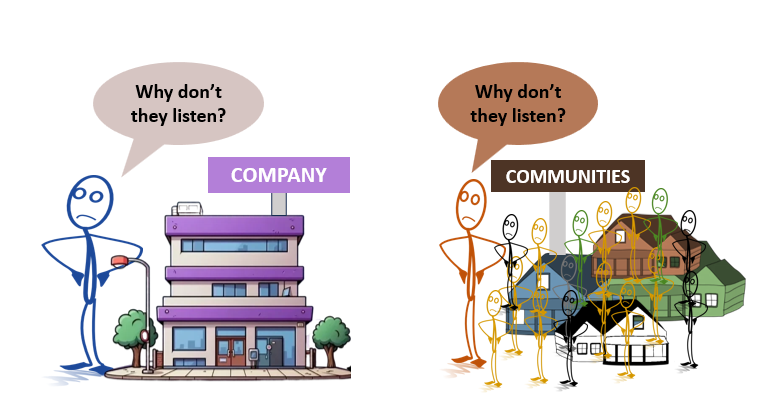
Often in our roles as business or community professionals, we encounter what we might call ‘company-community ‘situationships’. Companies and communities coexist like neighbors, yet the trust between them is minimal. There are no clear commitments, just expectations that each party will be accepting of the other’s behaviour. Conversations tend to be superficial rather than substantive, and the potential for mutual accountability is almost non-existent.
Below are a few the primary obstacles preventing a flourishing, trusting relationship between companies and communities.
Focusing excessively on compliance and overlooking the importance of respecting community interests. Many companies feel overwhelmed by the stringent environmental and social regulations in Indian law. India was the first country to establish a CSR law, but mere compliance is the minimum requirement and doesn’t differentiate a company or guarantee social acceptance for business operations. Indian companies often rely on ad-hoc, people-driven methods, that is designed to get clearances and not necessarily earning community trust. Unfortunately, community risk management in India lacks systematic and proactive organization.
The failure to demonstrate to communities that the business prioritizes avoiding harm to workers, communities, and community resources. This entails turning community assumptions or perceptions into genuine interest in understanding the company’s operations. For instance, if chimneys are associated with pollution, arranging community tours of the facility can be beneficial. When real harms exist, it’s essential to be transparent about these impacts, explain the measures taken to address community concerns, and outline future plans to minimize environmental and social damage.
The failure to meet commitments and promises made to communities, as well as discuss delays. These commitments can include a range of initiatives such as CSR projects, job opportunities, resettlement promises, access roads, promotions, or changes in employment status. Company officials often attribute delays to factors like management changes, budget constraints, or shifts in strategy, and they are aware whether commitments can be fulfilled or not. What harms the relationship between the company and the community is not only the failure to fulfil commitments but what kills it is the lack of adequate discussion with the community about reasons for delays, alternatives, and progress/plans to fulfil the commitments.
The failure to take responsibility for daily operational impacts and provide avenues for remedy is a significant issue. Business managers often avoid admitting mistakes due to the belief that it will lead to more problems. However, we have observed that when companies or specific departments take ownership of their daily negative impacts and behavior, communities appreciate the honesty displayed by the business. At the operational level, businesses often underestimate the importance of effective community listening mechanisms. In the age of social media company still boast about an ‘open-door policy’ or ‘suggestion boxes’. While these methods are useful for hearing from communities, they frequently lack the necessary follow-through to ensure that local grievances are responded and resolved timely and consistently.
To conclude let’s say that genuine care for communities and vice versa requires more than just award-winning CSR initiatives. Well-intentioned businesses and projects often face challenges due to a lack of community trust in the business itself and not in its CSR initiatives. We know from our experience, that losing a project because of a revoked social license is largely self-inflicted and stems from the company’s failure to understand that communities value dialogue even more than CSR.